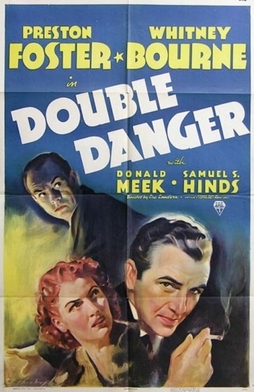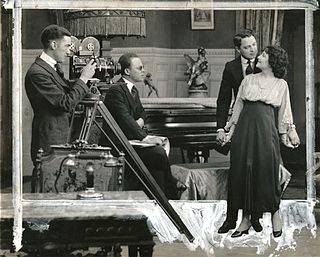
The Gay Divorcee is a 1934 American musical film directed by Mark Sandrich and starring Fred Astaire and Ginger Rogers. It also features Alice Brady, Edward Everett Horton, Eric Blore and Erik Rhodes. The screenplay was written by George Marion Jr., Dorothy Yost and Edward Kaufman. It is based on the Broadway musical, Gay Divorce, written by Dwight Taylor, with Kenneth S. Webb and Samuel Hoffenstein, adapting an unproduced play by J. Hartley Manners.

Roderick Ross La Rocque was an American actor.

Code of the Sea is a 1924 American silent drama film produced by Famous Players–Lasky and distributed by Paramount Pictures. It was directed by Victor Fleming and starred Rod La Rocque and Jacqueline Logan.

Cruise of the Jasper B is a 1926 American silent action comedy film produced by Cecil B. DeMille and directed by James W. Horne. The film is loosely based on the 1916 novel of the same name by American poet Don Marquis, although the film adaptation and novel share little in common.
Forbidden Paradise is a 1924 American silent drama film, directed by Ernst Lubitsch, produced by Famous Players–Lasky, and distributed by Paramount Pictures. The film is based on a 1922 Broadway play, The Czarina, by Edward Sheldon, who adapted the Hungarian-language book by Melchior Lengyel and Lajos Bíró. The play starred Doris Keane, in one of her last stage roles, as Catherine the Great. Basil Rathbone costarred with Keane. The film stars Pola Negri as Catherine the Great and Rod La Rocque in the Rathbone role. Clark Gable makes his second appearance on film.

The Golden Bed is a 1925 American silent drama film directed by Cecil B. DeMille. It is based on the 1924 short story Tomorrow's Bread by Wallace Irwin, originally published in Pictorial Review. Jeanie MacPherson wrote the screenplay.

Jazzmania is a 1923 American silent drama film directed by Robert Z. Leonard and starring his then-wife Mae Murray. In keeping with Murray's previous films and a few of her succeeding films, the movie possesses some of the most provocative attire worn by an actress in film up to that time. As with Fascination, Edmund Goulding wrote the original screen story and screenplay.

Rogues and Romance is a surviving 1920 American silent drama film directed by George B. Seitz. The film was a feature-length version of the serial Pirate Gold, also directed by Seitz, and was shot in Europe. The film survives incomplete in the Library of Congress collection and George Eastman House Motion Picture Collection.
Let Us Be Gay is a 1930 American pre-Code romantic comedy-drama film produced and distributed by MGM. It was directed by Robert Z. Leonard and stars Norma Shearer. It was based on and filmed concurrently with the 1929 play by Rachel Crothers which starred Tallulah Bankhead and ran for 128 performances at London's Lyric Theater. Critics generally preferred Tallulah's rendition to Shearer's.

Leathernecking is a 1930 American musical comedy film directed by Edward F. Cline, from a screenplay by Alfred Jackson and Jane Murfin, adapted from the Broadway musical comedy Present Arms, by Richard Rodgers, Lorenz Hart and Herbert Fields.

Gigolo is a 1926 American silent romantic drama film produced by Cecil B. DeMille and released by Producers Distributing Corporation. William K. Howard directed and Rod La Rocque and Jobyna Ralston star. The film is based on a novel, Gigolo, by Edna Ferber.

Wallace Smith was an American book illustrator, comic artist, reporter, author, and screenwriter.

Beau Bandit is a 1930 American Pre-Code Western film, directed by Lambert Hillyer, from a screenplay by Wallace Smith, based on his short story, "Strictly Business" which appeared in the April 1929 edition of Hearst's International-Cosmopolitan. The film starred Rod La Rocque, Mitchell Lewis, Doris Kenyon, and Walter Long. The story is based loosely on the legend of Robin Hood.

Rita La Roy was an American actress and dancer, beginning her career in 1929, and having her last significant role in 1940.
Hi, Gaucho! is a 1935 American comedy film directed by Tommy Atkins, from a screenplay by Adele Buffington. Released by RKO Radio Pictures on October 11, 1935, the film stars John Carroll, Steffi Duna, Rod La Rocque, and Montagu Love.

Double Danger is a 1938 American crime drama directed by Lew Landers, using a screenplay by Arthur T. Horman and J. Robert Bren based on Horman's story. The film stars Preston Foster and Whitney Bourne, with supporting roles by Donald Meek and Samuel S. Hinds. Produced by RKO Radio Pictures, it was released on January 28, 1938.

Paying the Piper is a 1921 American silent society drama film directed by George Fitzmaurice and written by Ouida Bergère. The film stars Dorothy Dickson, Alma Tell, George Fawcett, and Rod La Rocque. The film was released on January 16, 1921 by Paramount Pictures.

Don't Call It Love is a 1923 American silent romantic comedy film directed by William C. deMille and written by Clara Beranger and Julian Street based upon the play Rita Coventry by Hubert Osborne. The film stars Agnes Ayres, Jack Holt, Nita Naldi, Theodore Kosloff, Rod La Rocque, and Robert Edeson. The film was released on December 24, 1923, by Paramount Pictures.

Captain Swagger is a 1928 American synchronized sound crime drama film directed by Edward H. Griffith and stars Rod La Rocque. While the film has no audible dialog, it was released with a synchronized musical score with sound effects utilizing the RCA Photophone sound-on-film sound system. The film was released with both the sound-on-disc and sound-on-film formats. The film was produced and distributed by the Pathé Exchange company.

Filling His Own Shoes is a 1917 American silent comedy film directed by Harry Beaumont and starring Bryant Washburn, Hazel Daly and Rod La Rocque.

















